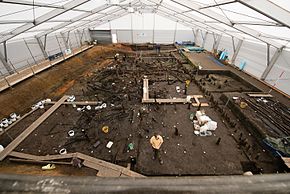Must Farm Bronze Age settlement
 |
|
| Location | Whittlesey, Cambridgeshire, England |
|---|---|
| Coordinates | 52°33′43″N 0°11′02″W / 52.562°N 0.184°WCoordinates: 52°33′43″N 0°11′02″W / 52.562°N 0.184°W |
| History | |
| Material | Wood |
| Periods | Bronze Age |
| Site notes | |
| Archaeologists | Cambridge Archaeological Unit |
| Public access | No |
| Website | www |
Part of a Bronze Age settlement was uncovered at Must Farm quarry, at Whittlesey, near Peterborough, in Cambridgeshire, England. The site has been described as "Britain's Pompeii" due to its relatively good condition, including the "best-preserved Bronze Age dwellings ever found" there, which all appear to have been abandoned suddenly following a catastrophic fire. The site is on a former river, inside Flag Fen basin, around 2 kilometres (1.2 mi) south of Flag Fen itself. Must Farm was named Best archaeological project and Best archaeological discovery at the 2012 British Archaeological Awards, and Best Discovery at the 2016 Awards.
Wooden posts were first recognised there in 1999, leading to preliminary excavations in 2004 and 2006. Early finds at the site include a rapier and a sword in 1969. Between 2011 and 2012, eight Bronze Age log boats were discovered. The boats were found in a small freshwater palaeochannel and were preserved due to waterlogging.Radiocarbon dating has indicated that the ages of these boats spanned a period of about 1,000 years, with the earliest examples dating to around 1750–1650 BCE. Some of the boats may have been deliberately sunk. They are now preserved at Flag Fen and are available to view on guided tours.
Bronze Age woven wooden fish traps and wattle-hurdle fish weirs were found in the same channel, together with metalwork including swords and spears.
{{{annotations}}}
In September 2015, the University of Cambridge's Cambridge Archaeological Unit began a dig, eventually covering 1,100 square metres (1,300 sq yd), the details of which were publicly disclosed in January 2016.Historic England have funded a £1.1 million project to excavate the site to gain as much knowledge of Bronze Age life in Britain as possible. Archaeologists found two circular wooden houses, from about 1000–800 BCE, and concluded that they were damaged by fire and that the platform on which they sat then slid into the river, where the fire was extinguished and the buildings and objects within them were preserved in the silt. About half of the settlement is thought to have been lost due to modern-day quarrying.
...
Wikipedia
